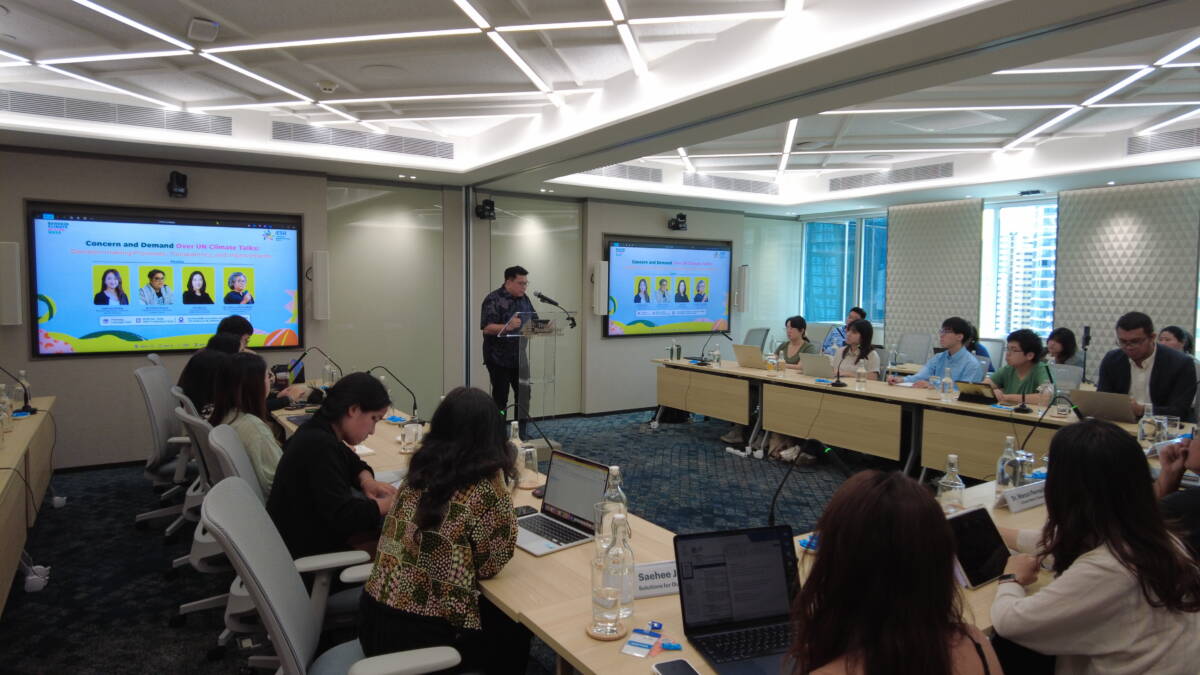Bangkok, October 2, 2025 – The UNFCCC has established the Conference of the Parties (COP) as a forum for global climate negotiations, incorporating the concerns and aspirations of multiple stakeholders, from governments to communities and individuals affected by climate change.
However, businesses, including fossil fuel companies, have also had a smooth path to participating in the COP negotiations as country delegates. The Guardian, in its publication, reported that 1,773 fossil fuel industry lobbyists were involved in COP29 in Azerbaijan in 2024. This has raised global concerns about the credibility and legitimacy of the UNFCCC.
Fabby Tumiwa, CEO of the Institute for Essential Services Reform (IESR), stated in a panel discussion titled “Concern and Demand Over UN Climate Talks: Decision-Making Processes, Transparency, and Improvements” during Bangkok Climate Action Week (BKKCAW) 2025 that civil society participation in the COP is increasingly difficult. This is indicated, among other things, by the limited badges allocated to civil society, and the increasing number of negotiators and lobbyists from large industries, even fossil fuel corporations, attending the COP.
“This limited participation means that affected countries, such as Southeast Asia, are increasingly delaying solutions to the climate challenges they face,” said Fabby.
Rachita Gupta, from the Global Campaign to Demand Climate Justice (DCJ), echoed this sentiment, noting that the UN negotiation process, particularly the COP forum, is increasingly moving away from crucial global issues such as world peace. The forum, which should be a forum for seeking various solutions, is instead deepening the global multilateral crisis.
“At COP-28 in Dubai, fossil fuel business representatives dominated the negotiations so much that there was no statement on the phase-out of fossil fuels, only a commitment to phase down,” said Rachita.
The large representation of fossil fuel companies means bigger lobbying from the fossil fuel industry to prolong fossil fuel use and divert funding away from climate-resilient projects. This issue caught the attention of Wanun Permpibul, Executive Director of Climate Watch Thailand.
“It’s increasingly difficult for developing countries and island nations to secure funding for climate resilience projects because simply attending the COP requires enormous financial effort, not to mention the difficult negotiation process aimed at securing funding commitments. Ironically, the funds are there, but not much is allocated for climate,” said Wanun.
The lack of participatory and inclusive negotiation processes is also a concern for Ivy Leung, Executive Director of CarbonCare Innolab. Leung emphasized the gap in knowledge and access to information on how to meaningfully participate for countries and communities located in the global south. CarbonCare Innolab is attempting to bridge this gap by advocating public involvement, especially young people, in the UN dialogue process and global climate diplomacy.
“The COP’s increasingly distant outcomes from pressing issues have made young people increasingly skeptical about participating in the negotiations. We still believe it’s important to attend the COP, but we also continue to monitor developments regarding the effectiveness and efficiency of the COP negotiations,” Leung added.
Saehee Jeong, Head of Diplomacy Solutions for Our Climate (SFOC), sees the Asian region as a region living with the impacts of the climate crisis and the need to consistently call for funding and assistance for climate action.
“With its diverse governmental and geographical contexts, Asia is an important laboratory for climate diplomacy,” said Saehee.

